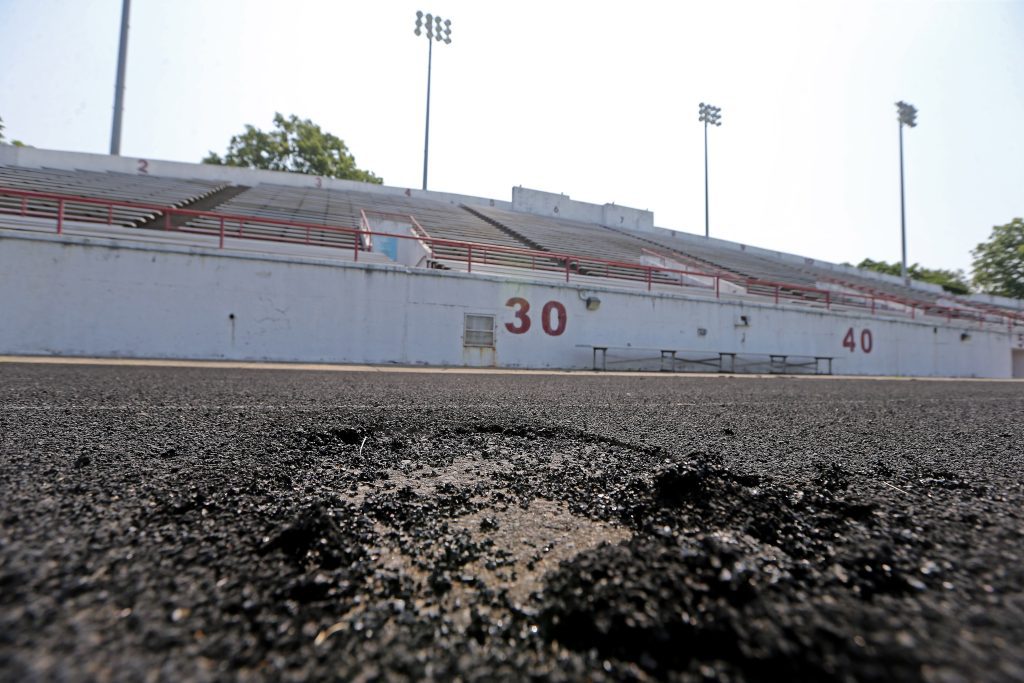A judge in Suffolk Superior Court sees the planned extensive renovation at Franklin Park’s White Stadium as a victory for all Boston residents.
The cooperation between the city and a group working to bring a professional women’s soccer team to the stadium was successful in court on Friday, as Justice Sarah Ellis rejected a request from a group of residents and advocates to stop the project.
Ellis dismissed motions from The Emerald Necklace Conservancy, a nonprofit park advocacy group, and 21 city residents to halt the massive $100-million project.
Boston Unity Soccer Partners, an all-female ownership group, secured an expansion bid last September to join the National Women’s Soccer League as the 15th team. The team is set to play at Franklin Park in 2026.
Gary Ronan, a city attorney, emphasized during a recent hearing how a preliminary injunction could derail the project entirely. He described the dispute as an “attack” on the effort by BUSP.
Justice Ellis wrote in her decision that the plaintiffs' claim of irreparable harm without a preliminary injunction is not convincing, as the renovation of White Stadium and the agreements between the City and BUSP will negatively affect the nature of the stadium and limit the public’s enjoyment.
The justice added that she was not convinced by the plaintiffs' arguments.
Louis Elisa, a plaintiff and member of the Garrison Trotter Neighborhood Association, compared Ellis’ decision to the 1857 Dred Scott case, which upheld slavery in United States territories.
Elisa stated that the court’s failure to consider the concerns of possible harm and displacement was akin to the Dred Scott decision, where the rights of black citizens were not taken seriously.
Renovations at the run-down park and stadium, where half of the grandstands were destroyed by fire decades ago, would triple the number of hours the stadium could be used. 90% of the usage would be dedicated to Boston Public School student-athletes and the community, as project proponents have stated.
Boston Unity is scheduled to contribute $50 million, with the city matching that investment.
Mayor Michelle Wu expressed her satisfaction with the court's clear ruling that the lawsuit from the Emerald Necklace Conservancy should not hinder the ongoing community engagement to improve White Stadium and Franklin Park.
Mayor Wu also stated that the City finally has a committed partnership to invest in and sustain the improvements that students, park lovers, and neighbors deserve at the historic facility.
The plaintiffs in their lawsuit and responses questioned the constitutionality of the proposed stadium's redevelopment because they think it makes public land private.
They also pointed out that the stadium would be used exclusively by the new professional women’s soccer team for 20 weekend days from April to November, which is about 77% of Saturdays during the warmer months. They argued that this could displace BPS football games from being played at the venue.
According to Emerald Necklace Conservancy president Karen Mauney-Brodek, the plaintiffs filed the lawsuit because they wanted the city to slow down and respect the public process.
Mauney-Brodek stated that they support the renovation of White Stadium and Franklin Park, but they do not support the involvement of a professional sports team that would displace the local community for the next 30 years while privatizing and profiting from this public resource. She also mentioned that the major redevelopment is being fast-tracked without adequate community input or proper environmental review.
During the March 6 hearing, Ronan argued that Boston Unity will be limited to no more than 20 games a year and 20 practices, and the team’s practice schedule will be arranged around BPS students and athletics, which he referred to as the “first priority.”
An evaluation of the facility conducted last year found that the stadium needed to be improved and expanded, with recommendations including a larger staff office, updated press box, enhanced locker rooms, and an eight-lane track.
The BUSP expects that their initiative will have various economic benefits on the broader community. Construction is anticipated to generate over 500 jobs, with the workers being employed onsite for two years. Additionally, it is proposed that about 300 permanent jobs will be created once the stadium is renovated.
In her decision Friday, Ellis described the overall effort as “a clear benefit to BPS and the residents of Boston.”
According to a survey by the Franklin Park Coalition, 56% of the more than 700 respondents supported the project, while about 20% said they’re opposed to it.
The project has been under review by various public agencies and community stakeholders including the Boston Planning & Development Agency, Landmarks Commission, Parks Commission, among other entities.
Early site work is expected to start in April and construction in January.
BUSP stated on Friday evening that they welcome the Emerald Necklace Conservancy to collaborate with them and are proud to be part of the project that honors the legacy of White Stadium for future generations.









